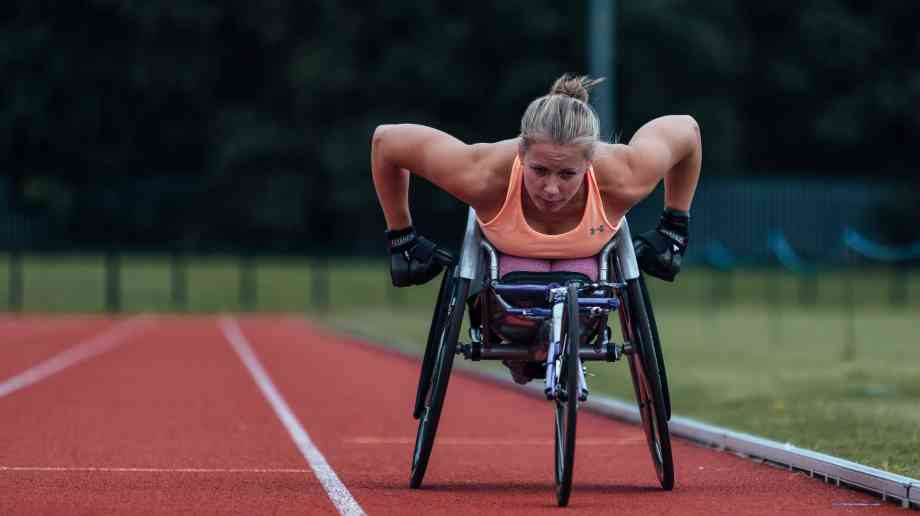Home / Sports stars say teacher confidence key to primary PE
Sports stars say teacher confidence key to primary PE

Over the next few weeks, every primary school in England will receive the first instalment of the Primary PE and Sport Premium, and sports stars such as paralympic athlete Hannah Cockroft MBE says teacher confidence is key to primary PE being a success.
The continuation of the Primary PE and Sport Premium, launched in March 2013, was confirmed in July by the Government. It followed a united call by the sport sector and leading sports stars, co-ordinated by the Youth Sport Trust, to ensure that the next generation continue to access the huge wellbeing and educational benefits that come from play, sport and daily physical activity.
As the ringfenced funds land with schools, sports stars speak out about how teacher training and confidence is vital to ensuring every child has a positive and fulfilling experience of PE and sport in their primary years.
Hannah Cockroft MBE, World Champion, Paralympic athlete and Ambassador for the Youth Sport Trust, said: “At school, PE for me was either sitting in the library doing homework, doing physiotherapy in a separate room or sitting on the side watching my friends have fun. This was a consistent situation throughout primary school and until my second year of secondary school. I was the only disabled pupil at both my mainstream schools and the teachers just didn’t have the training or, most importantly, the equipment for me to safely be able to get involved.
“If my school had access to the Primary PE and Sport Premium, I think the funding would have helped the school have specialist equipment to have allowed me to get involved, or more importantly provided further education for teachers on how to adapt lessons to include me. That would have made all the difference. It would also have taken a lot of pressure off my parents who worked hard to keep me fit and active outside of school, because my chances at school were so limited.
“It wasn’t until I was 12-years-old that I found out about Para sport and the opportunities available for me.”
Jenny Meadows, GB athlete, World and European Medallist, Totally Runable director and part of a team of National School Sport Champions, said: “I have always enjoyed sport and being active. However, even though I excelled at it, I spent most of my time at school trying not to stand out as a good sports performer as I was affected by gender stereotypical messages that girls aren’t supposed to be good at it. Through my various ambassador roles, I’ve spent a lot of time in primary schools, and it’s staggering how this message hasn’t changed over time.
“I’m a strong advocate for the place that schools have in creating social change through positive early-years’ experience and I’m delighted that the PE and Sport Premium funding has been used by some schools to address these issues and make needed change. I have seen some amazing examples of how primary schools have been curious enough to think about what is going on with participation and confidence levels between girls and boys in sport and physical activity and look deeper.”
There are five key indicators that the government has outlined the Primary PE and Sport Premium money should be spent on. These include:
1. The engagement of all pupils in regular physical activity - the Chief Medical Officer guidelines recommend that all children and young people aged 5 to 18 engage in approximately 60 minutes of physical activity a day, of which 30 minutes should be in school
2. The profile of PE and sport is raised across the school as a tool for whole-school improvement
3. Increased confidence, knowledge and skills of all staff in teaching PE and sport
4. Broader experience of a range of sports and activities offered to all pupils
5. Increased participation in competitive sport
The charity wants to shine a light on how primary schools across the country are responding to the challenges created by the pandemic and help schools share best practice.
Ali Oliver, Chief Executive of the Youth Sport Trust, said: “Now more than ever, it is so important that schools are supported to invest this funding in tackling the immediate challenges created by the pandemic as well as more strategic investment. This will secure sustainable improvements and long-term transformation of PE and its relevance to the wider education and development of children.
“Very few people realise that many primary class teachers only receive an average of six hours of Physical Education tuition. At a time when children’s wellbeing and lifestyles are changing so much, now is the moment to invest in a new future for PE, sport and physical activity in our schools.
“Schools across the country have done a fantastic job of responding to this crisis to ensure that children continue to receive a high-quality programme of PE and school sport and it is vitally important that their learnings are shared, and knowledge tapped so that all schools in receipt of this funding can benefit.”
Latest News
03/10/2025 - 10:01
Spending on educational support for children with high needs has risen sharply in recent years, creating unsustainable financial pressure on both local authorities and central government, new analysis warns.
02/10/2025 - 09:31
The Always Active Uniform is a flexible, comfortable school uniform including active footwear, designed to support spontaneous movement and daily activity throughout the school day.
01/10/2025 - 10:23
The Welsh Government has agreed to continue a licensing deal which will give all learners at Welsh state schools free access to Microsoft 365 at school and at home.
01/10/2025 - 09:51
Schools will play a greater role in ensuring every pupil has a clear post-16 destination, with a new approach to a guaranteed college or FE provider place available as a safety net being tested.
30/09/2025 - 09:51
The Chancellor has committed over £10 million in funding to guarantee a library for all primary schools by the end of this parliament.







